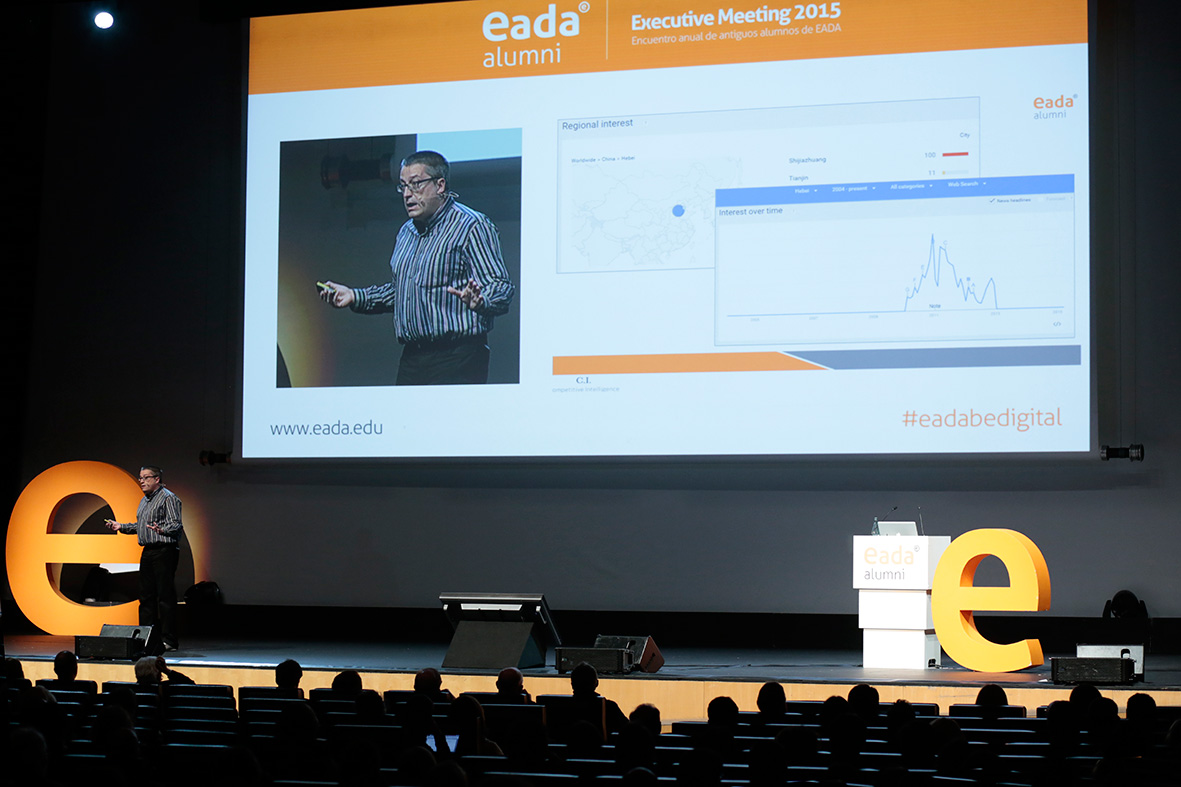The EADA Executive Meeting 2015 highlights eight digital challenges for managers
Under the heading ‘Are you a digital manager?’, the latest edition of the Executive Meeting 2015, the big annual alumni event organised by EADA Alumni, analysed the digital competencies that managers need today in order to achieve their strategic goals inside the company. The meeting also evaluated the competencies in which managers score better as well as those where they don’t make the grade, and it did so based on a study by the consultancy RocaSalvatella on the eight digital competencies required by management posts - strategic vision, digital training, online work, customer orientation, information management, digital communication, online leadership and digital communication- as well as a research study carried out by EADA professors EADA Ramon Costa y Lluís Rosés, in collaboration with Penteo, on the degree to which these competencies have been introduced.

Eva García, director of EADA Alumni, accompanied by EADA professors Ramon Costa (right) and Lluís Rosés (left).
Pending issues
The main weak point of managers in digital environments is customer orientation – a competency related with the capacity to understand, to know how to interact and satisfy the needs of new customers on the web-. According to Ramon Costa, “the majority of managers and intermediate posts who were consulted – over 600 – admit that they do not use digital resources intensively enough, and this is due to a lack of knowledge concerning technology’s potential to bring added value and differential value as well as to a certain fear and aversion towards a new way of leading and introducing digital processes inside the organisation”.
For Elena Gómez, president of Adigital, “the fact is that many CEOs still belong to the pre-digital era and find it hard to understand new digital logics and to use them appropriately for the business”. For this reason the experts insisted on the need to carry out continuous learning on digital issues –both new trends as well as digital resources- in order to lead this transformation in the company. And as Helena Guardans, president and member of the board of Sellbytel Group, put it “managers must address new challenges, such as coordinating outsourced teams in other countries or managing user incidents which may come from different online platforms”.
But in addition to customer orientation, Spanish managers have another pending issue: strategic vision, a competency that has to do with the capacity to apply digital technologies to company strategy. In this respect, Costa made it clear that “although it is the responsibility of all the company’s professionals to adapt to the changes brought on by digitalisation it is the manager’s responsibility to further the development of a digital culture and of these digital competencies inside the company”.
It is therefore a matter of a new way of managing where the big challenge has to do with taking advantage of the amount of information that companies and users generate through social networks and turn it into knowledge. According to Josep Lluís Sánchez, who is involved in the launching of Co-Society, an initiative oriented towards promoting collaboration among companies, “the digital manager must take strategic decisions based on reliable data which s/he obtains in real time, and not intuitively as in the past”. Along the same lines, Genís Roca, president and cofounder of RocaSalvatella, emphasised that “the business is not competitive if it is not next to a flow of new ideas, information and knowledge”.
Difficulties in transferring digital knowledge
On the other hand, the digital competencies for which the consulted managers got the highest scores were digital expertise, digital information and communication management. Despite this, professor Ramon Costa warned that “most of the consulted managers mistakenly think that they have broad expertise in digital resources and that they use them adequately”. However he pointed out “what we found was that this was not so, given that they still find it difficult to transfer their digital expertise to the team”.

